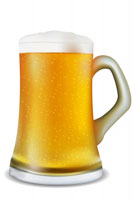
Top stories





Marketing & MediaAds are coming to AI. Does that really have to be such a bad thing?
Ilayaraja Subramanian 1 day

More news
















A dark cloud hangs over the liquor industry in the form of the recently leaked draft bill on a proposed new National Liquor Act. "The National Liquor Bill as leaked may not be in its final form but, as it stands, is draconian in the extreme," says Adrian Botha, a consultant to the Industry Association for Responsible Alcohol Use.
"Government says it is trying to curb alcohol abuse, but its actions verge on a prohibitionist approach," says Norman Adami, MD of SA Breweries
Whether changes to the proposed bill will be made remains to be seen, but the indications are not good. "When the interministerial committee is ready, it will comment on whether there are any changes to the bill," says health ministry spokesman Fidel Hadebe
Health minister Aaron Motsoaledi has made it clear that he is unmoved by liquor industry protestations. Speaking in parliament in April on measures to curb alcohol and tobacco use, he said: "The measures we will announce will leave no holy cows - that includes alcohol control which some have attempted to intimidate us not to ever mention, just as they have tried before with the issue of tobacco and tobacco products."
Among the liquor bill's many proposals is a ban on alcohol advertising. There would be a "complete blackout", says Botha. "Even liquor stores will not be able to display themselves as such and, in store, will be allowed only to display the price of particular brands."
Botha believes a ban on advertising will have absolutely no effect on people's drinking habits. He asks: "If advertising causes people to drink, why is it that over 60% of South Africans do not drink at all?"
Says Adami: "Our advertising aims to influence people's choice of brand, not influence people to drink."
A ban on advertising by tobacco firms has proved a futile exercise. Botha says tobacco industry data shows that in 2011 28,3bn cigarettes were sold in SA, of which 6,3bn were illegal. This was up from the 2008, pre-ban total of 28bn cigarettes, 3bn of which were illegal.
What a ban on liquor advertising would do is huge damage to the advertising industry. "The best estimate for liquor companies' ad spend is R2,6bn/year," says Botha. This, he adds, excludes sport and other sponsorships which will also be banned.
A ban on advertising would also put a stop to the department of trade & industry's aim to have more black entrepreneurs entering the liquor industry. "Market shares of existing players would freeze as potential entrants would be unable to tell people about their products," says Botha.
In Gauteng, frustration and confusion are nothing new for owners of the province's 8000 legal township shebeens who have borne the brunt of an almost decade-long fiasco. Since 2004, a sword has hung over the heads of the shebeen owners who, through their association, the Gauteng Liquor Forum (GLF), won a last-minute battle last week to prevent enactment of the province's new liquor act. The GLF's victory halted potentially devastating consequences for many shebeen owners.
The bill, under which the new act was to be implemented, has been in the making since 2004 but was never opened to discussion by the liquor industry, shebeen owners or the public. "The bill was created in a vacuum," says GLF secretary Mlungisi Majola "It will now not be approved by [the Gauteng] parliament until all stakeholders have had an opportunity to have their say."
For shebeen owners, a rethink on the act ends uncertainty surrounding the renewal of temporary permits issued annually since 2004. There was a real danger that permits would not be renewed at the end of June, says GLF chairman Linda Madida
Under the act, many GLF members faced closure because of failure to comply with issues not of their making, such as their shebeen's location, he adds.
Liquor outlet owners in Johannesburg's more formal areas have also had their share of problems. Manny Cabeleira, owner of the 82-year-old Radium Beer Hall in Orange Grove, is one. "For no good reason we were served with a closure order by a liquor board official," says Cabeleira. "We tried to no avail to have our licence reinstated and had to approach the high court, where we won our case unopposed and with costs."
Cabeleira adds: "How could a small business owner afford to take his case to court? He would probably just fold."
At least Cabeleira has his licence back. Things are not going as smoothly for others trying to obtain a new licence in Gauteng. Problems began in August 2011 when the Gauteng Liquor Board, beset by mismanagement and a liberal dose of corruption, imposed a moratorium on new licences for six months.
Gauteng's liquor director, Max Mothlake, said at the time of the issuing of the ban: "If falsified licences weren't being printed by corrupt staff internally, they were printed externally in collusion with staff members."
The ban halted sales of businesses involving liquor licences and the opening of new ones. Among those affected was Famous Brands, which abandoned the opening of what was to be its flagship Keg pub in upmarket Melrose Arch.
The liquor board has been open for business again for three months, says Mothlake. "It should take no more than three months to issue a new licence," he says.
Spur Corp MD Pierre van Tonder is not reassured. "Obtaining a liquor licence is still a nightmare," he says. "We have new restaurants waiting for licences applied for six to nine months ago."
The assault on the liquor industry is doing no-one any good, says Botha. "The liquor industry is 100% behind curbing abuse but the way to address the problem is to enforce existing legislation in areas such as under-age drinking and drunken driving."
Source: Financial Mail